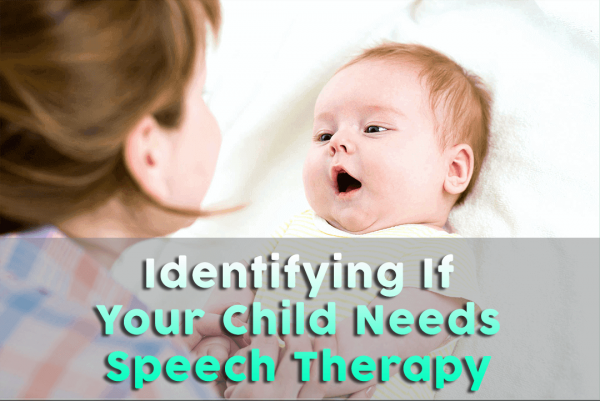
When my youngest daughter, Nora, was 18 months old, I was watching an old video of my other daughter, Violet, from when she was a bit younger than that. She was talking so clearly and suddenly it made me realize that Nora really wasn’t. In fact, she was really only saying a few basic words (mom, uh-oh, no) and had actually stopped saying a word or two that she’d been saying before. Instantly, all of the mom-guilt started kicking in. How had I not noticed sooner? What had I failed to do with Nora that I must have done with my other two kids? But the truth is, every kid is different. Some kids will have delays no matter what you do and no matter how soon you notice. What’s important is what you do once you realize there is a problem.
Here are some red flags to look out for, along with steps to take if you notice a delay.
Language Delay Red Flags
It is important to remember that all children develop at different rates, and seeing just one red flag on this chart reflected in your child does not mean he/she has a language delay. Instead, look at your child as a whole to decide if it’s time to talk to your pediatrician.
Expressive language is the way that someone expresses their needs, wants, and ideas.Expressive language ranges from using eye gaze to look at an object to using full sentences to retell an experience. The following are possible expressive language delay red flags for children under 3 years of age:
- Not cooing by 6 months of age
- Not babbling by 9 months of age
- Not having a first word by 15 months of age
- Not having consistent words by 18 months of age
- Not having two word combinations by 24 months of age
- Not being able to understand your child’s speech at 24 months of age
- Strangers not being able to understand your child’s speech at 36 months of age
- Not showing interest in communicating with others (at any age)
Receptive language is your ability to understand what is going on around you or what is being said to you. It ranges from imitating somebody’s actions to following directions. The following are possible receptive language delay red flags for children under 3 years of age:
- Not turning towards a noise like a rattle or voice by 6 months of age
- Not being able to follow simple one-step directions at 12 months of age (such as “bring me your cup”)
- Not being able to point to one body part by 18 months of age
- Not being able to follow simple two-step directions by 36 months of age (such as “pick up the ball and give it to me”)
- Not responding to simple questions by vocalizing or gesturing yes or no by 12 months of age
- Not understanding common gestures like holding your arms out for a hug (by 12 months of age) or holding up a hand for a high five (by 24 months of age).
- Not responding (with either gestures or vocalizations) to greetings by 12 months of age
- Not able to follow eye gaze or finger pointing when talking about an object by 24 months of age
- Not being able to point to 6 body parts by 30 months of age.
-Taken from the Kid’s Creek Therapy website
Steps To Take If You Notice a Delay:
1. Talk to your child’s pediatrician about your concerns. They can provide a medical diagnosis of expressive or receptive language delay that you can then take to the county. If the pediatrician doesn’t think you have cause for concern, you can still move forward to try to get early intervention, but it’s a little easier with their support.
2. If your child is under 3, call and schedule an evaluation at the Infant and Toddler Connection of VA. If your child is over 3 you’ll need to contact your local school district for a full evaluation.
3. The Infant and Toddler Connection of VA will have two different professionals evaluate your child, through observation and by having you fill out questionnaires, to determine if your child has a significant enough delay to qualify for early intervention.
4. If your child qualifies, you will work with his/her service coordinator to create an Individualized Family Service Plan (IFSP) for your child. The plan includes current information about the child’s skills and both long and short term goals that you have for them.
5. Your child will be matched with a service provider who will come to your house or your child’s daycare for weekly therapy sessions that work around your schedule.
6. After both 6 months and one year of intervention the goals on the IFSP will be reviewed and modified as needed.
7. When your child turns three they will age-out of early intervention and it will be your decision if you want to continue services through your local school district. If you decide that it’s necessary, the process should begin months before your child’s birthday because the school district’s evaluation process is a lot more in depth and can take awhile.
Nora has been receiving services through the Infant and Toddler Connection now for just over a year and we have seen amazing growth! She still has difficulty being understood at times, but her vocabulary has grown from three words to hundreds of words. In fact, her speech therapist, (who is awesome, btw) and I agree that she won’t need to continue services once she turns three because we both know that she won’t qualify this time. She’s just made so much progress!
If you have a child that you’re concerned about, don’t hesitate to talk to his/her doctor and trust your instincts! You know your child better than anyone, and you know when something doesn’t feel right. If you have more questions, please feel free to reach out to me on Facebook or through email at agoodenoughmom@gmail.com and check out the links below.
♥ Erin
Useful Links:
Infant and Toddler Connection of VA- http://www.infantva.org
Henrico County Public Schools-http://henricoschools.us
Hanover County Public Schools- http://www.hcps.us
Chesterfield County Public Schools- http://mychesterfieldschools.com
More Info on Individualized Family Service Plans (IFSPs)
Simplified Language Delay Info
Nursery Rhymes to Help with Early Language Development
Mouth Exercises for Kids with Low Tone
Effective Speech Therapy Activities for Toddlers











